It’s been nearly six years since Democrats have controlled the U.S. Senate. Currently, Republicans hold it by a 53-47 majority (including two independents, Sen. Bernie Sanders of Vermont and Sen. Angus King of Maine, who both caucus with the Democrats.)
This time around, the race for the all-important U.S. Senate majority centers on four seats Democrats must flip to gain outright control. Should Democrats retake the White House, they would need three seats because the vice president would break a 50-50 tie.
Republicans, meanwhile, are hoping to hold on to and even strengthen their majority — and legislative advantage — for another session of Congress.
These are the 10 Senate races that could potentially tip the balance of power in the Senate.
Alabama: Sen. Doug Jones (Democrat) vs. Tommy Tuberville (Republican)

Considered the most endangered Democrat in the U.S. Senate, Alabama Sen. Doug Jones is facing Republican Tommy Tuberville, who harnessed college football coaching fame and President Donald Trump’s endorsement to block former Trump Attorney General Jeff Sessions’ attempt at a political comeback. Sessions has since appeared with Tuberville on the campaign trail.
The race in solidly pro-Trump Alabama will test whether Democrats can make inroads in the Deep South and if Jones’ 2017 special election win was a fluke driven by the fact that the GOP nominee, Roy Moore, faced a litany of sexual misconduct allegations. While Tuberville entered the race as a strong favorite, Jones holds a 4-to-1 spending advantage and both campaigns sent out fundraising emails contending the race is tightening.

Jones, 66, has been on a campaign blitz while Tuberville, 66, has adopted a strategy akin to running out the clock. Tuberville, the former Auburn University football coach, has announced fewer public campaign events, concentrated media appearances on conservative talk radio and has refused to debate Jones. Positioning himself as a political outsider, Tuberville’s message has been heavy on support for Trump.
Jones, the first Alabama Democrat elected to the Senate in a quarter-century, is trying to prove his 2017 victory was no outlier. But Trump is expected to easily carry the state again, meaning Jones would have to win over some Trump voters.
This race likely marks the GOP’s best chance to flip a Democrat-held Senate seat, as the nonpartisan Cook Political Report lists this contest as “leans Republican,” meaning Tuberville has the edge.
Arizona: Sen. Martha McSally (Republican) vs. Mark Kelly (Democrat)
Democrats have long considered Arizona as one of the top targets in their effort to gain the four seats they need to win Senate control.
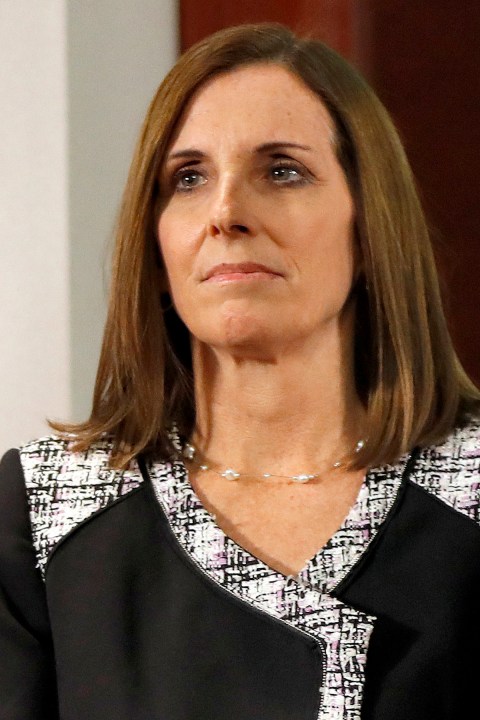
GOP Sen. Martha McSally ran for Arizona’s other Senate seat in 2018 but lost to Democrat Kyrsten Sinema, and Republican Gov. Doug Ducey later appointed her to the seat held by Sen. John McCain until his death of an aggressive brain cancer.
McSally faces another challenging race as she squares off against Democratic challenger Mark Kelly; the election will decide whether McSally or Kelly finishes McCain’s last term.
In their first and only face-to-face debate early this month, Kelly — a first-time candidate — accused McSally and President Trump of failing to lead the country through the coronavirus outbreak, bringing on an economic calamity and leaving people suffering. He presented himself, as he has throughout the campaign, as an independent voice uninterested in partisan politics.
But the faceoff provided McSally a much-needed chance to gain ground on Kelly, who has consistently led the race in polling and fundraising. Throughout the campaign McSally has carefully avoided criticizing Trump, who maintains overwhelming support within her Republican base but is unpopular with many of the more moderate voters who will decide the election.

Kelly, a retired astronaut and former Navy pilot, is married to former U.S. Rep. Gabby Giffords, who survived being shot in the head during a constituent event in Tucson in 2011. The couple went on to found an advocacy group, now known simply as Giffords, that works around the country to advance gun-control laws such as a universal background check requirement.
As an Air Force pilot, McSally was the first American woman to fly in combat and later the first woman to command a fighter squadron in combat. After retiring, she was elected to the U.S. House from the district once represented by Giffords, repeatedly eking out narrow victories in a closely matched district.
Kelly has an edge in this race, according to the Cook Political Report, which has this contest as “lean Democratic.”
Colorado: Sen. Cory Gardner (Republican) vs. John Hickenlooper (Democrat)
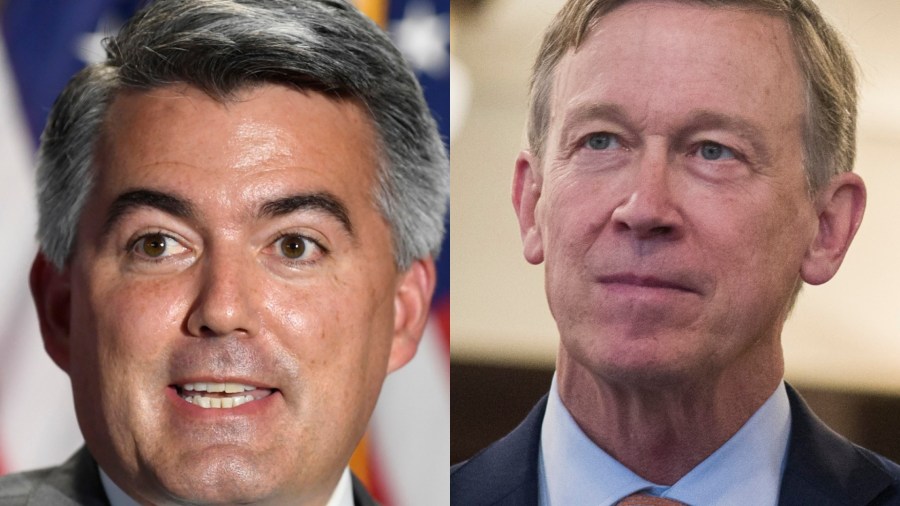
Former Colorado Gov. John Hickenlooper, 68, is challenging Republican Sen. Cory Gardner, 46, in Colorado, a state that has trended sharply to the left since President Trump’s 2016 election.
Republicans are privately pessimistic about Gardner’s chances. The first-term senator is a skilled campaigner but has long been seen as one of the party’s most vulnerable senators because of the state’s changing political landscape.
Last month, a major Democratic group pulled its last remaining ads from the closely watched U.S. Senate race, a sign that the party thinks its nominee — a previous Democratic presidential candidate — has the crucial race in the bag.
This is among the more likely GOP-held seats that Democrats can flip, with the Cook Political Report giving Hickenlooper the edge.
Georgia: Sen. David Perdue (Republican) vs. Jon Ossoff (Democrat)
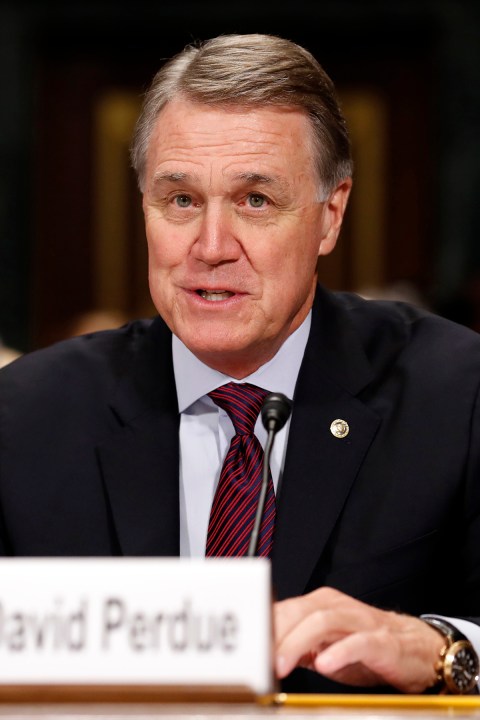
Republican Sen. David Perdue and Democratic challenger Jon Ossoff are locked in tight, bitterly fought race.
In the second and final debate Wednesday, the candidates battered each other with what has become the familiar refrains of their bitter race: Perdue repeatedly accused Ossoff of backing radical, socialist policies while Ossoff slammed Perdue’s handling of the coronavirus pandemic and Republican efforts to overturn the Affordable Care Act. Ossoff slammed Perdue as a “crook” who downplayed the coronavirus pandemic. Perdue, who is seeking a second term, denied the accusation.
The incumbent was among a group of senators whose stock trades came under scrutiny. Perdue has denied any wrongdoing, saying the trades were handled by outside advisers and that he was cleared by a Senate Ethics Committee investigation.

A final debate was canceled after Perdue dropped out, saying he would attend a campaign rally with President Trump instead.
Polls indicate the contest is extremely close, and Democrats are hoping Ossoff could give the party their first U.S. Senate win in Georgia since 2000. However, another candidate, Libertarian Shane Hazel, is also on the ballot, raising the potential that Ossoff and Perdue could head to overtime in the form of a Jan. 5 runoff — required if no candidate receives more than 50% of the vote in November.
Perdue, 70, is a former business executive seeking his second term in the Senate. Ossoff, 33, heads a media company that investigates crime and corruption for news organizations. Hazel is a Marine Corps veteran and podcast host.
This one is a toss ups, according to the Cook Political Report.
Iowa: Sen. Joni Ernst (Republican) vs. Theresa Greenfield (Democrat)
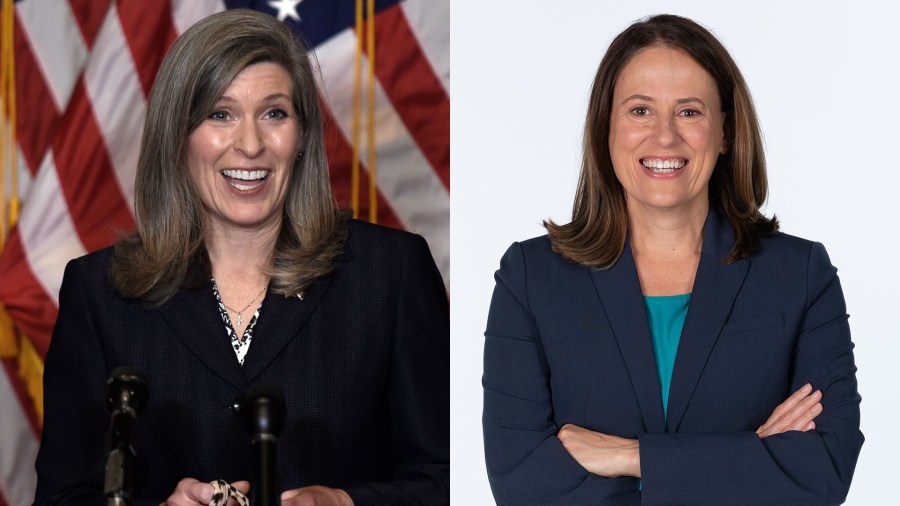
Joni Ernst burst onto national politics in 2014 as a gun-toting, hog-castrating, motorcycle-riding candidate who was going to shake up Washington. She won, defeating an establishment Democrat.
Now, as the first-term Republican senator seeks reelection, she finds her fate tied to President Trump’s in a state where support for him has eroded significantly as voters have harshly assessed his handling of the pandemic, and hers. Ernst’s ads this time advocate not the reversal of the Affordable Care Act, but upholding its most popular provision: somehow guaranteeing health coverage for people with preexisting medical conditions while gutting other provisions in the law.
Theresa Greenfield, a political newcomer and Des Moines businesswoman, is emphasizing health care and a far more robust response to the pandemic, along with emphasizing Social Security and union benefits she received as a young widow.
Greenfield has argued that Ernst has hewed too closely to Trump. In voting to confirm Trump’s Environmental Protection Agency head, Ernst is complicit, Greenfield says, in the agency’s renewable fuel waivers to oil companies, which forced the closures, some temporary, of at least a dozen-plus ethanol plants in Iowa.
This one’s a toss up, according to the Cook Political Report.
Maine: Sen. Susan Collins (Republican) vs. Sara Gideon (Democrat)
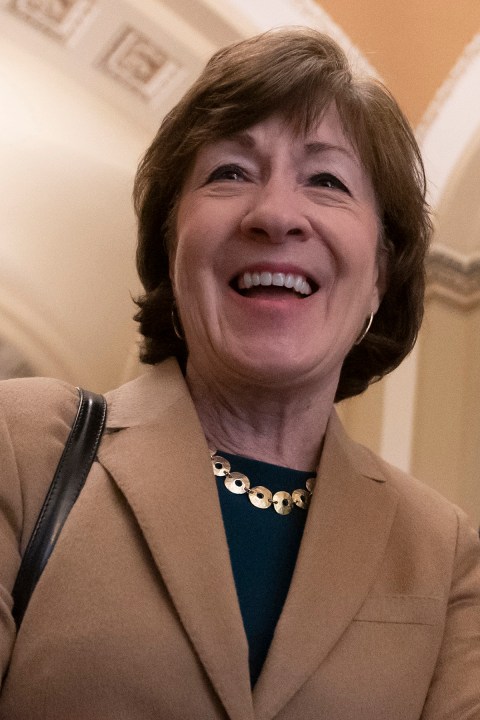
Republican U.S. Sen. Susan Collins — the last GOP member of Congress from New England — finds herself battling for her political survival in Maine. The state known for its fierce independent spirit as much as its lighthouses and lobsters is becoming less so, and Democrats, not independents, now comprise the biggest voting bloc.
After easily winning her last election, Collins is squaring off against a tough opponent Sara Gideon, a Democrat and the current speaker of the Maine House.
Polls show an extremely close race despite more than $120 million allocated for ads by the candidates and their allies. And the money is still pouring into the race, one of a handful that could decide which party controls the Senate. Losing the fundraising battle, Collins is focusing on her message that she’s an experienced, bipartisan senator who’s in line to become chair of the appropriations committee, which directs all federal spending. That would be in stark contrast, she said, to a “rookie” senator.

Collins, 67, insists she’s the same centrist who’s willing to work with members of either party. Gideon, 48, has sought repeatedly to link Collins with Senate Majority Leader Mitch McConnell and President Trump, urging Mainers to vote for change.
Their last debate came just days after Collins voted against the president’s latest Supreme Court nominee, Amy Coney Barrett. Collins said she did so not based on Barrett’s qualifications, but based on fairness, since Republicans denied an election year vote on one of President Barack Obama’s nominees. Gideon used Trump’s judicial appointments to attack Collins on women’s reproductive rights, and on health care.
The race will be decided by ranked choice voting, providing a new layer of uncertainty. Under the election system, voters will get to rank all four candidates — including two independents, progressive Lisa Savage and conservative Max Linn — in order of preference. If no one wins a majority of first-place votes, then the last-place candidates are eliminated and those voters’ second choices are reallocated until a majority winner emerges.
The Cook Political Reports lists this one as a toss up.
Michigan: Sen. Gary Peters (Democrat) vs. John James (Republican)
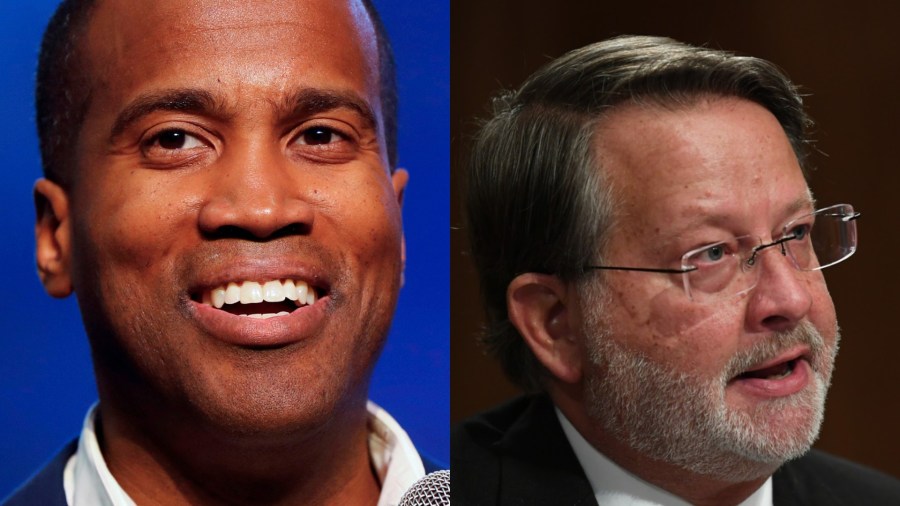
First-term Sen. Gary Peters of Michigan is betting voters care more about his effectiveness, as he desperately fights to keep a seat his party is counting on to take the Senate majority. The 61-year-old former investment adviser is a rare Senate candidate this cycle, a Democrat running in a battleground state Trump carried in 2016.
But Peters is finding it tougher to shake top Republican recruit John James, a business executive and combat veteran. Peters’ fate could hinge on his ability in the closing weeks to seize on Democratic enthusiasm and win over younger voters, women, independents and especially African Americans. All largely back both Biden and Peters, but a bigger percentage remain undecided in the Senate race, according to some polls.
Democrats say the bitter Supreme Court nomination fight has helped nationalize the Michigan contest and highlight the stakes, including the fate of the Obama-era health care law and potentially reproductive rights. Experts say the result will depend in large part on the top of the ticket. The party that wins the presidential race almost always takes the Senate contest, too, and it could prove tough for either candidate to substantially outperform his party’s presidential nominee. Republicans have won just one of Michigan’s last 15 Senate races, in 1994.
Peters has a slight advantage, according to the Cook Political Report, which lists this race as “leans Democrat.”
Montana: Sen. Steve Daines (Republican) vs. Steve Bullock (Democrat)
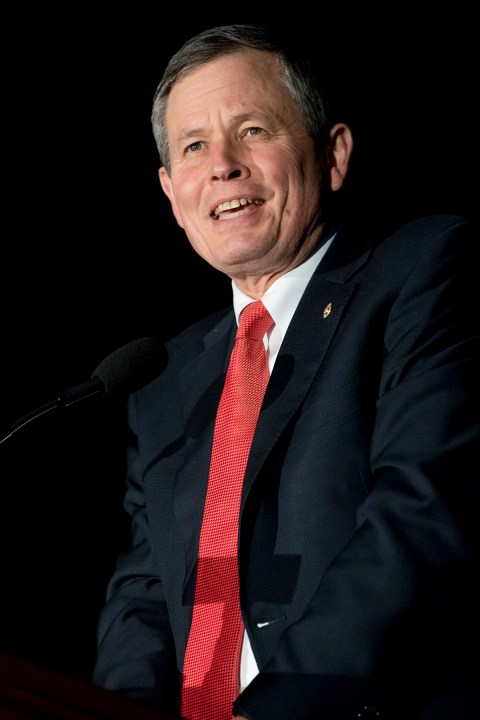
Political groups fighting for control of the U.S. Senate have poured more than $118 million into the contest between Montana’s Democratic Gov. Steve Bullock and Republican incumbent Sen. Steve Daines, a record shattering figure for the sparsely-populated state that dwarfs spending on a per-voter basis in all other Senate battleground states.
Both Montana candidates are popular and familiar to the state’s voters. Bullock, a 54-year-old native of the capital, Helena, is coming off a second term as governor following two terms as Montana attorney general. Daines, 58, grew up in Bozeman and was an executive at a high-tech company. He served one term in Congress and cruised to victory in a 2014 Senate race.

Bullock made campaign finance reform a key piece of his failed bid for the Democratic 2020 presidential nomination. As governor he signed a measure to increase spending transparency in state elections.
During debates with Daines, he’s railed against the millions of dollars received by the Republican from political action committees backed by the oil industry, pharmaceutical companies and other corporate interests. Daines points out that the Democrat helped funnel money into races across the country when he chaired the Democratic Governors Association.
The Cook Political Report lists this one as a toss up.
North Carolina: Sen. Thom Tillis (Republican) vs. Cal Cunningham (Democrat)
With more than $246 million spent, the contest between GOP Sen. Thom Tillis and Democratic Senate candidate Cal Cunningham is the most expensive U.S. Senate race in history.

In the final days of the closely contested race, recent developments have Cunningham bypassing uncomfortable questions about his extramarital activities. Whether his strategy alters the outcome will depend on whether swing voters are set on removing Tillis — and potentially ending GOP control of the chamber — even if it means a replacement facing a sex scandal.
Cunningham acknowledged weeks ago that he exchanged sexually suggestive texts with a woman who is not his wife. A few days later, The Associated Press reported additional texts and interviews confirming they had an intimate encounter as recent as July — while Cunningham was deep in the hard-fought campaign.
Tillis and Republican allies are jumping on Cunningham’s reticence, running ads that question his trustworthiness in contrast with his TV-commercial persona as an Army officer who rooted out corrupt military contractors in Iraq.

Cunningham — a former state senator and Iraq War veteran — has tried to frame the race on issues and ousting Tillis, who is seeking his second term. He’s blamed Tillis for failing to expand COVID-19 relief and voting often to do away with President Obama’s health care law. Groups from the Human Rights Campaign to the North Carolina League of Conservation Voters to unions are coming to Cunningham’s side.
Campaign operatives have said for months the outcome will depend on independent voters, who now make up one-third of the state’s electorate.
The Cook Political Report has this one as a toss up.
South Carolina: Sen. Lindsey Graham (Republican) vs. Jaime Harrison (Democrat)
Republican U.S. Sen. Lindsey Graham is fighting for his political life as he faces off against Democratic challenger Jaime Harrison.

Harrison, an associate Democratic National Committee chairman and former lobbyist, is Graham’s most stalwart general election opponent to date. A fundraising powerhouse, the Democrat has amassed a war chest of more than $100 million, skyrocketing past previous Senate fundraising records and blanketing the state with advertising and mailers.
Graham has acknowledged the toughness of the race, which some polls have shown as neck-and-neck, although the Republican has raked in cash of his own. Raising about $67 million, Graham’s third-quarter haul of $28 million represented a quarterly record for any GOP Senate candidate. Third-party groups have poured in more money, resulting in ad saturation.
There was an undercurrent throughout the race over the battle to confirm Justice Amy Coney Barrett to the U.S. Supreme Court. As Senate Judiciary Committee chairman, Graham oversaw that contentious process, including a committee vote in which no Democrats participated and a largely partisan Senate floor confirmation.
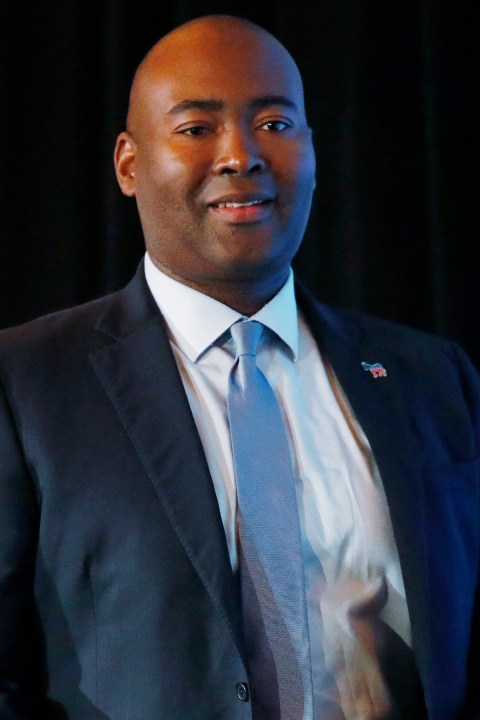
The process kept Graham in the national spotlight for weeks, during televised hearings and media appearances to discuss the process. Answering a reporter’s question on Capitol Hill about his reelection contest, Graham made a plug for campaign contributions, a comment that drew an ethics complaint from the South Carolina Democratic Party.
Harrison has portrayed Graham as a career politician, too long in Washington, and too far removed from the lives of his constituents. Harrison has also highlighted Graham’s previous opposition to election-year high court nominations.
Arguing that “elections have consequences,” Graham has said that he felt certain Democrats would do the same if given the chance.
This one is a toss up, according to the Cook Political Report.






















